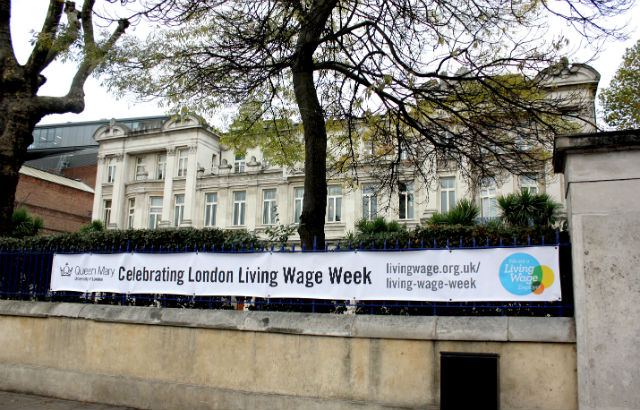Queen Mary – proud supporter of the Living Wage
Queen Mary was the first accredited university in the UK in 2006 to pay a real Living Wage, and is also a founding partner of the Living Wage Foundation, which was established in 2011 to recognise the leadership of employers who choose to pay a real Living Wage based on the cost of living, not just the government minimum. Read on to hear from Khalid Rouas from our Estates and Facilities team about his lived experience of the Living Wage.

It's Living Wage Week, and on Monday the Mayor of London, Sadiq Khan, announced the new Living Wage rates including the London Living Wage at £10.55 per hour and £9 for the rest of the UK. The real Living Wage is an hourly rate independently calculated on the basis of what it costs to live and support a family. Speaking at the Living Wage Week launch in London, Sadiq Khan said: “Nearly a fifth of all jobs in London pay less than the Living Wage. Nobody who goes out to work every day should have to live in poverty. We can, and must, do better.”
In addition to adopting the Living Wage in 2006, Queen Mary also introduced new working conditions for staff. By January 2008, every staff member at the university – regardless of rank or role – received a basic minimum package of 30 days’ annual leave, access to sick pay, an annually negotiated pay increase and an employer-contribution pension scheme.
 Speaking at the launch event of Living Wage Week in London, Khalid Rouas, Cleaning Operative from our Estates and Facilities team, shared his own lived experience of the Living Wage:
Speaking at the launch event of Living Wage Week in London, Khalid Rouas, Cleaning Operative from our Estates and Facilities team, shared his own lived experience of the Living Wage:
“Prior to the Living Wage being introduced, I found it very hard to make ends meet for myself and my family. It was often hard to find money to pay the rent. Having a full time job, but earning little, meant that I would not be able to access certain benefits, so providing for my family was very difficult, especially with a wife and two children.
“Feeding my family properly and paying the bills was very difficult. I would have to work a lot of overtime to try to ensure I could buy proper clothes for my children. Working so many hours meant I would not see very much of my family which hurt me, especially with the children growing up.
“All of these problems left me anxious and worried about how I would support my family, especially if emergencies came up.
"Earning the London Living Wage has helped me considerably. I can now afford to support my family properly and am not constantly anxious about where the rent money, bills or clothes for my children will come from.
“I do not have to work seven days a week just to ensure that my family are provided for. This means that I can spend more time with my family, help with my children’s education, and be a better father and husband.
“I am very grateful to the London Living Wage organisation and Queen Mary for the London Living Wage which has had such a big effect on myself, my family, and so many other families where the Living Wage is being paid. Without this, I would not be able to stand here today, happy and proud of what I do.”
Professor Peter McOwan, Vice-Principal for Public Engagement and Student Enterprise, said:
“We are extremely proud Queen Mary was the first accredited university in the UK to pay a real Living Wage. Listening to Khalid’s story shows the life-changing impact the Living Wage can have on people, their families and their communities. We hope that by paying our staff fairly we are setting an example that will help the campaign as it grows into a national movement.”
Hear from our students
Last year, we celebrated Living Wage Week by sharing stories from three Queen Mary students who had part-time jobs at our university. Find out what being paid the London Living Wage meant to them, and the impact it’s had on their lives here.
More information
Working in partnership with groups such as Citizens UK, research from Queen Mary supports the campaign for a Living Wage, engaging with policy makers to improve lives. The Living Wage aims to have an impact on high rates of ‘in-work poverty’ that affects millions of households in the UK by introducing a higher minimum pay threshold based on the amount an individual needs to earn to cover the basic costs of living.
As a principal partner of the Living Wage Foundation, a Citizens UK initiative, research from Queen Mary’s School of Geography has provided evidence to support the campaign for employers to adopt the living wage.
 Speaking at the launch event of Living Wage Week in London, Khalid Rouas, Cleaning Operative from our Estates and Facilities team, shared his own lived experience of the Living Wage:
Speaking at the launch event of Living Wage Week in London, Khalid Rouas, Cleaning Operative from our Estates and Facilities team, shared his own lived experience of the Living Wage: